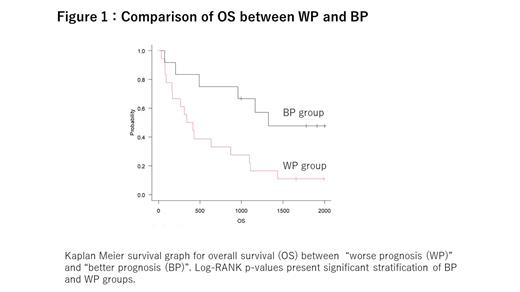Background: Comprehensive gene mutation profiling of primary central nervous system lymphoma (PCNSL) revealed genomic abnormalities associated with the NFκB signaling pathway and immune escape (Chapuy B, et al. Blood 2016). Although this has led to advances in targeted therapy, there are only a few candidate biomarkers for diagnosis and prediction of survival in PCNSL. Recurrence still occurs at high rate of over 60% and therapeutic resistance is a significant challenge in the management of recurrent PCNSL. Until now, the systemic profiling of tumor micro-environment (TME) was performed through gene expression analysis by whole transcriptome analysis (WTA) and single-cell RNA sequencing analysis (Heming M, et al. Genome medicine 2022), and stratification in PCNSL was attempted by using spatial transcriptome analysis (Xia Y, et al. Leukemia 2023). However, TME of PCNSL and their impact on prognosis remain uncertain.
Objective: We performed this study to investigate the prognostic impact on survival and establish novel prognostic biomarkers in PCNSL.
Methods: We analyzed the expression levels of 770 neuroinflammation-related (NFR) genes by the NanoString nCounter technology in tumor samples from 30 PNCSL patients. The clinical significance of genes and their association with prognosis were assessed. Genes related to “worse prognosis (WP)” or “better prognosis (BP)” were identified. We performed the univariable analysis using a cox proportional hazards model to evaluate the predictive value of expression of genes related to WP and clinical risk factors, such as age, sex, serum lactate dehydrogenase level, Karnofsky Performance Status (KPS), consciousness levels at diagnosis and lymphoma involvement of the deep brain structure. Gene expression data related to WP were subjected to multivariate analysis with clinical variables with p values less than 0.15 in the univariate analysis.
The genes associated with WP were further validated using WTA of an independent PCNSL cohort (n=30, previously published by Fukumura K, et al. Acta neuropathologica 2016).
Results: The median age at diagnosis was 69 years old (range, 32-83). The median follow-up period was 25 months (range, 1-110 months), with overall survival (OS) at 3 years of 39.7% and progression free survival at 3 years of 25.4%. Notably, 48 of 770 NFR genes were highly expressed in the WP group (3-year OS, 22.2%), compared with the BP group (3-year OS, 66.7%) (Figure 1). We found that oligodendrocyte and astrocyte-related signatures were enriched in the WP-associated gene set. Among clinical prognostic factors, KPS > 70 (p=0.0293), and consciousness levels at diagnosis (other than JCS 0-1) (p=0.104) were relatively associated with poor OS (p < 0.15) in univariate analysis. Multivariate analysis revealed that high expressions of TUBB4A (p=0.028, HR:3.88), S100B (p=0.046, HR:3.093) and SLC6A1 (p=0.034, HR:3.765) were significantly related to death independent from KPS and consciousness levels at diagnosis. Expression levels of these 3 genes were also significantly associated with poor OS in a validation cohort.
Conclusion: Our observations suggest high expression of TUBB4A, S100B and SLC6A1 are the clinical indicators to predict poor prognosis in PCNSL patients. Furthermore, these data suggest that genes related to TME may play a crucial role in the pathogenesis of PCNSL, complementing the well-known involvement of the NF-kB signaling pathway.
Therefore it is necessary to continue research focused on TME-targeted therapeutics to encounter drug resistance and refractoriness in PCNSL.
Disclosures
Sakata-Yanagimoto:Kyowa Kirin Co.,Ltd.: Honoraria; Eisai Co., Ltd.: Research Funding; Mundipharma K.K.: Research Funding; Otsuka Pharmaceutical.: Research Funding. Nagane:Hoya Technosurgical: Research Funding; Teijin Pharma: Research Funding; Eisai: Honoraria, Research Funding; Tanabe-Mitsubishi: Research Funding; Daiichi-Sankyo: Honoraria, Research Funding; Otsuka Pharma: Research Funding; Nippon-Kayaku: Research Funding; Chugai Pharma: Honoraria, Research Funding; Kyowa-Kirin: Honoraria, Research Funding; Novocure: Consultancy, Honoraria; Ono Pharma: Consultancy, Honoraria, Research Funding; CSF Behring: Research Funding; Asahi-Kasei Medical: Research Funding; Ohara Pharma: Honoraria; Bayer Yakuhin, Ltd: Honoraria; Sanei: Research Funding. Nishikawa:CHUGAI PHARMACEUTICAL CO., LTD.: Honoraria; ONO PHARMACEUTICAL CO., LTD.: Research Funding. Narita:Ono Pharmaceutical company: Honoraria, Research Funding; Eisai: Honoraria, Research Funding; Taiho Pharmaceutical: Research Funding; Ohara Pharmaceutical company: Research Funding; Sumitomo Pharma Oncology: Consultancy, Honoraria, Research Funding. Ichimura:DAIICHI SANKYO COMPANY, LIMITED: Research Funding; RIKEN GENESIS CO., LTD.: Research Funding; Gold ribbon network: Research Funding; Sumitomo Dainippon Pharma Co., Ltd: Research Funding; Idorsia Pharmaceuticals Ltd, Idorsia Ltd: Other: Endowed Courses. Ishikawa:DAIICHI SANKYO COMPANY, LIMITED: Speakers Bureau; Eisai Co., Ltd: Honoraria, Speakers Bureau; Otsuka Pharmaceutical.: Speakers Bureau; Mitsubishi Electric.: Research Funding. Chiba:Thyas: Research Funding; Astellas: Research Funding; Kyowa Kirin: Research Funding; Chugai Pharmaceutical: Honoraria; Bayer Pharma: Honoraria; Eisai Co., Ltd.: Honoraria.


This feature is available to Subscribers Only
Sign In or Create an Account Close Modal